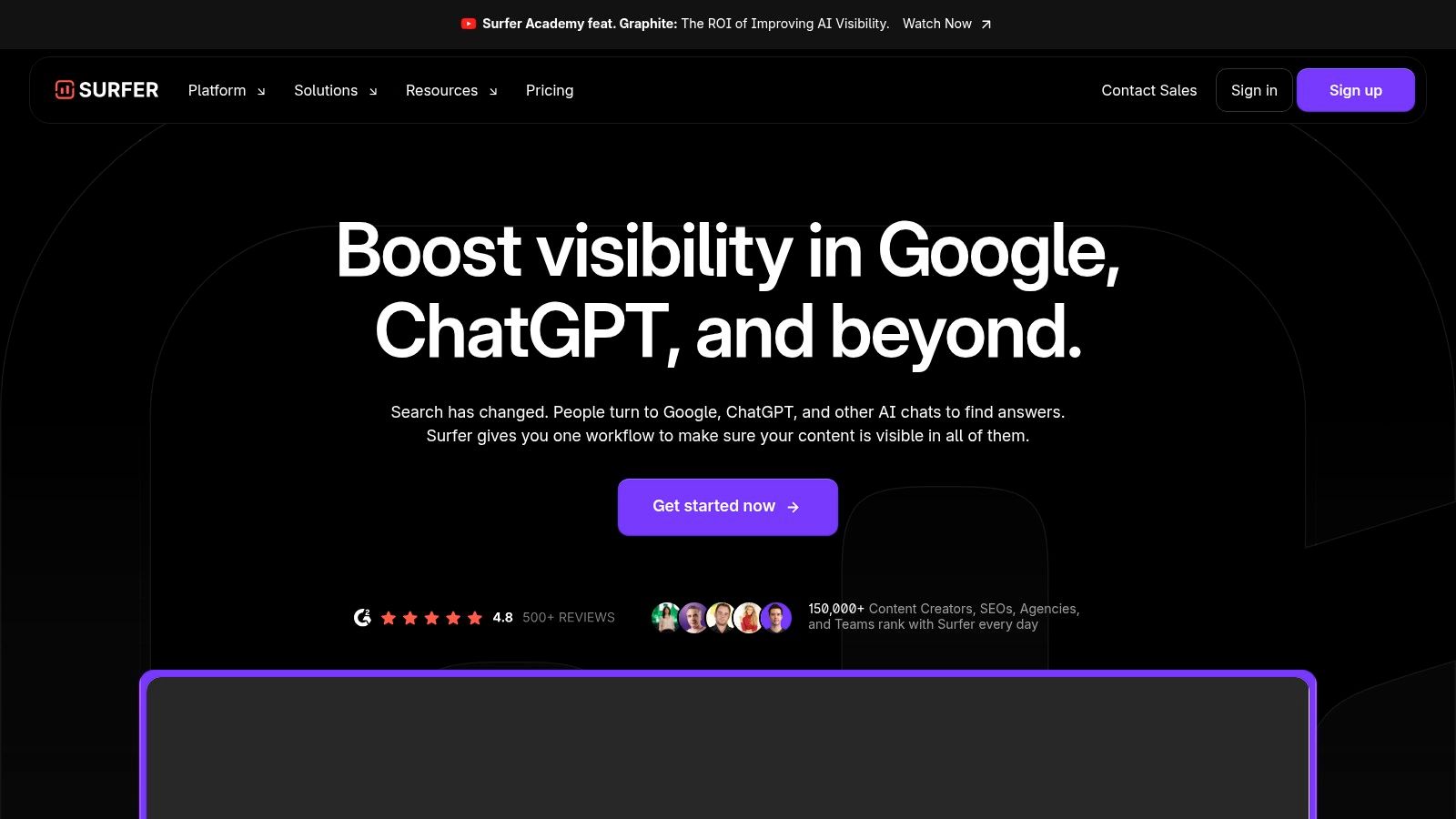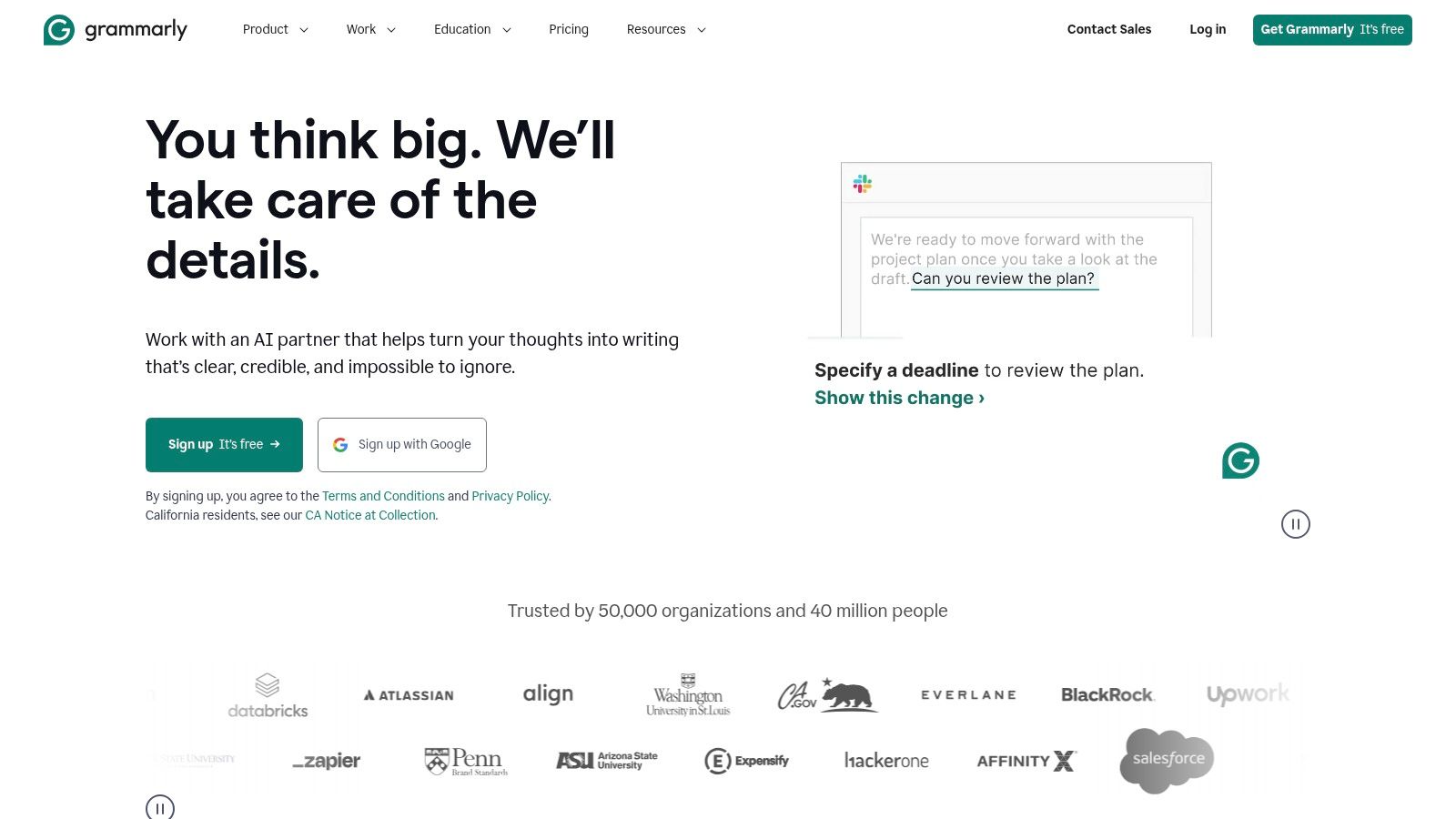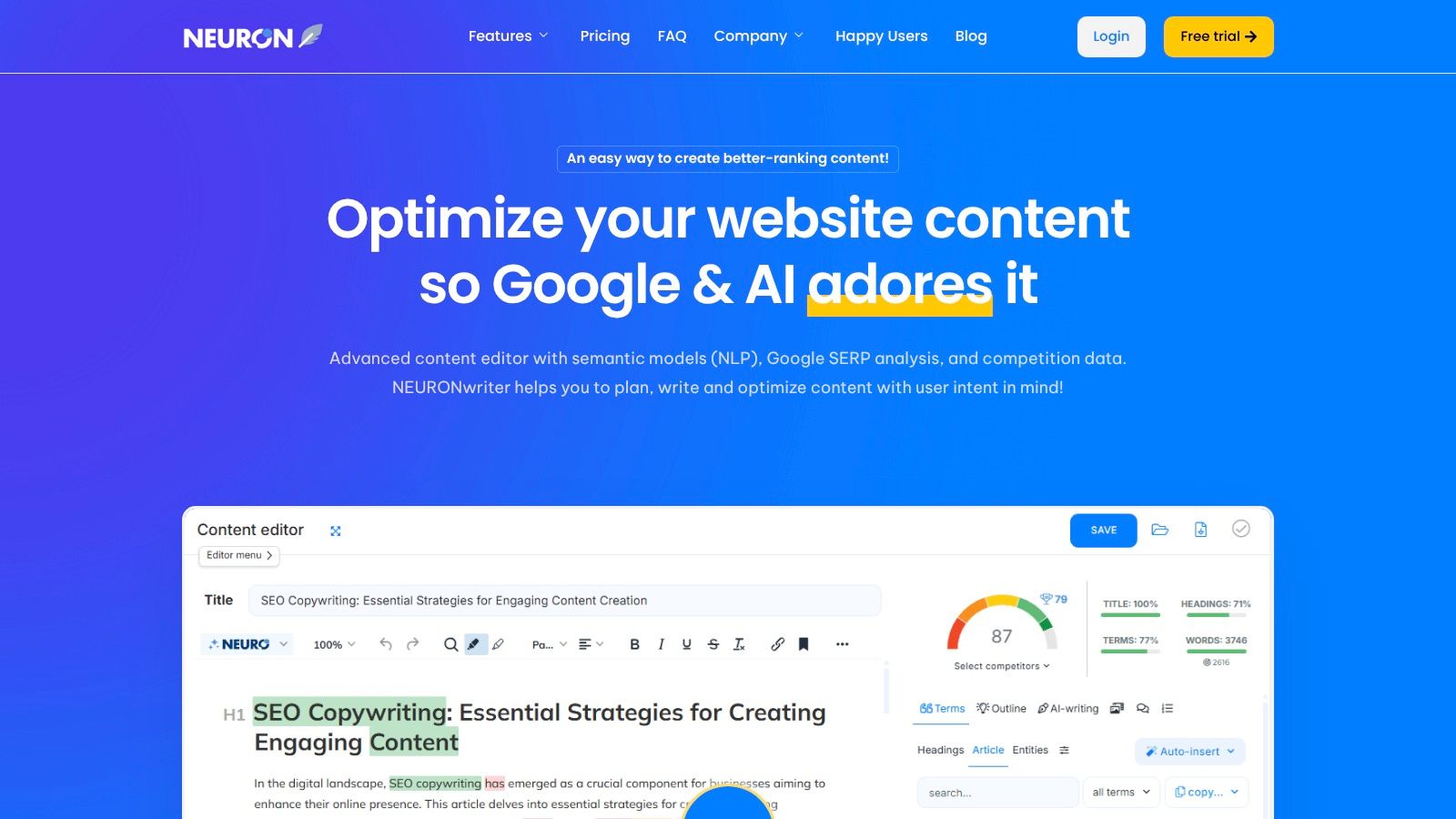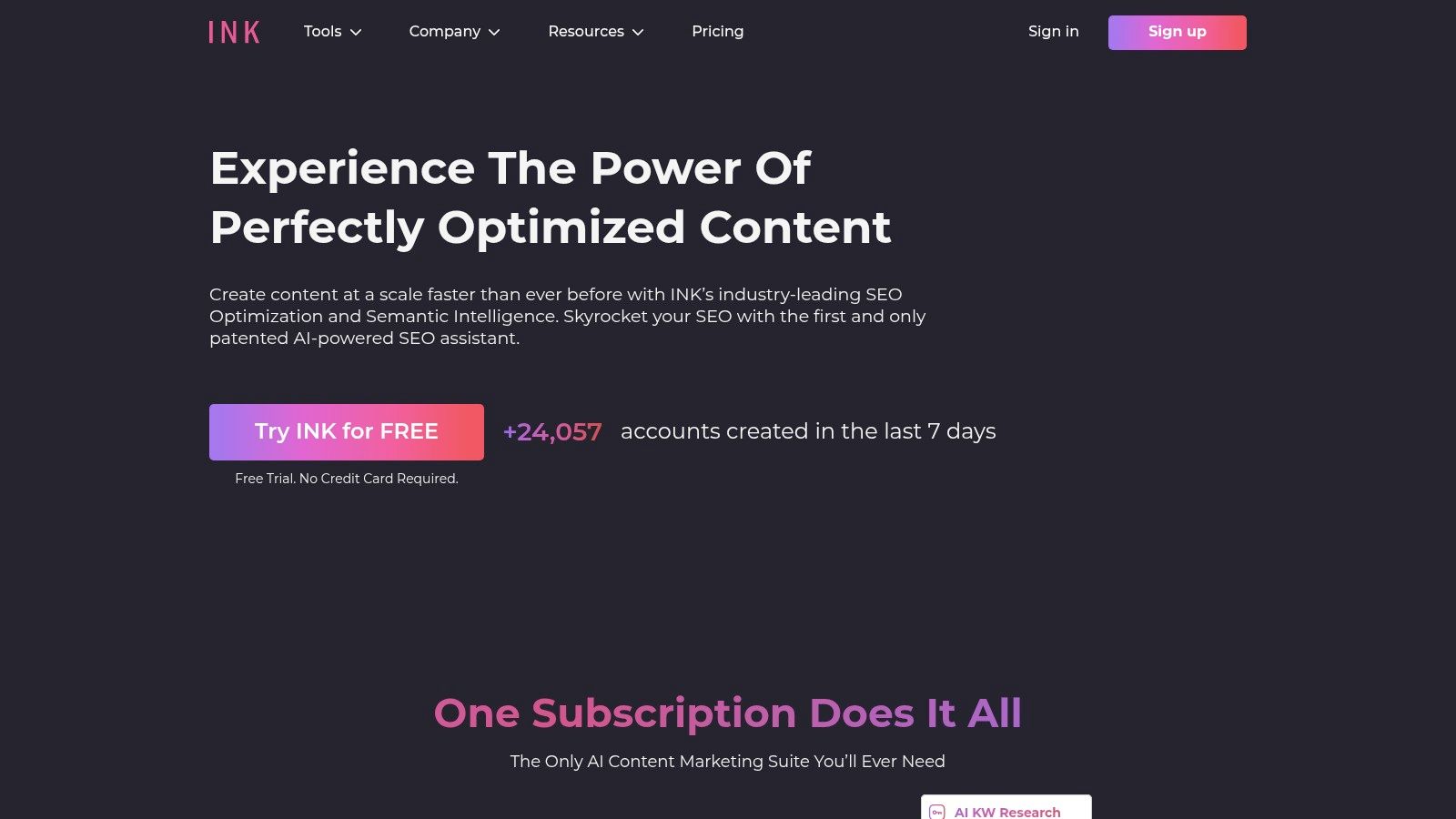12 Best seo writing tools You Should Know

Creating SEO content that ranks requires more than just good writing. It demands a strategic approach powered by data, competitor analysis, and optimization. This is where SEO writing tools become indispensable, transforming your content creation from a guessing game into a repeatable, high-performance process. These platforms solve the core problem of aligning your content with what search engines and users are actively looking for, helping you identify the right keywords, structure your articles for maximum impact, and optimize on-page elements before you even hit publish.
This guide moves beyond generic feature lists to provide a deep-dive analysis of the best SEO writing tools available today. We'll explore a curated selection of platforms, from all-in-one SEO suites like Semrush and Ahrefs to specialized content optimization tools like Surfer and Frase. Each review is designed to give you a clear, practical understanding of how the tool works in a real-world workflow, complete with screenshots and direct links.
Our goal is to help you cut through the noise and select the right tool for your specific needs, whether you're a solo founder, a freelance writer, or part of a small marketing team. You will learn:
- Which tools excel at specific tasks like keyword research, content brief generation, or AI-powered writing.
- How to integrate these tools into your existing content workflow for maximum efficiency.
- The key differences in features, pricing, and ideal use cases for each platform.
By the end of this article, you will have a clear roadmap to choosing the software that will elevate your content strategy, improve your search rankings, and drive meaningful organic traffic. Let's dive into the tools that will make your content work harder for you.
1. Semrush
Semrush is a comprehensive, all-in-one SEO platform that excels by integrating deep analytical tools with a robust content creation workflow. It’s an ideal choice for marketers and businesses who want to manage the entire content lifecycle, from initial ideation to final optimization and tracking, within a single ecosystem. This makes it one of the best SEO writing tools for teams that need a unified source of truth for their content and search strategies.
The platform's standout feature is the SEO Writing Assistant. It functions as a real-time content coach, integrating directly into Google Docs, WordPress, and the Semrush interface. As you write, it provides actionable recommendations based on your target keywords, covering readability, tone of voice, originality, and crucial on-page SEO factors. This live feedback loop helps ensure every piece of content is primed for search performance before you even hit publish.
What makes Semrush particularly powerful is its ability to connect deep keyword and competitor research directly to content creation. You can seamlessly move from identifying high-value topics to generating a detailed content brief and then writing the article, all guided by data from the platform. For a deeper understanding of how to use its data effectively, check out this guide on keyword research for small business.
Best For & Pricing
- Best For: Marketing teams and SEO professionals who need an integrated suite for research, content creation, and performance tracking.
- Pricing: Plans start at $129.95/month, with higher tiers unlocking more features and usage limits. The content marketing tools are available on the Guru plan ($229.95/month) and higher.
Pros & Cons
- Pros: Its all-in-one nature means you can manage keyword research, competitive analysis, and content optimization in one place. The Google Docs and WordPress integrations streamline the writing and publishing process significantly.
- Cons: The platform can be overwhelming for beginners due to its sheer number of features. The most valuable content tools are locked behind the more expensive Guru and Business plans, making it a significant investment.
2. Surfer
Surfer is a data-driven content intelligence platform that excels at helping writers and marketers reverse-engineer the first page of Google. It analyzes top-ranking pages for a target keyword and generates a detailed, actionable blueprint for creating content that has a high probability of ranking. This makes it one of the best SEO writing tools for those who want a clear, quantifiable path to outranking their competitors.

The platform’s core feature is its Content Editor, which provides a real-time score for your draft based on hundreds of on-page factors. As you write, it suggests important NLP terms and phrases to include, ideal word count ranges, heading structures, and image counts. This direct, SERP-based feedback loop removes much of the guesswork from content optimization, guiding you to create a comprehensive article that satisfies both search engines and users.
What makes Surfer particularly effective is its focus on correlation analysis. It doesn't just give you a generic checklist; it provides guidelines derived directly from what is currently working for your specific search query. You can seamlessly move from identifying a topic to generating a brief, outlining the structure, and optimizing the final draft, all within a workflow designed for maximum search performance.
Best For & Pricing
- Best For: Freelance SEO writers, content agencies, and in-house marketing teams focused on producing highly optimized, competitive on-page content at scale.
- Pricing: Plans start at $89/month for the Essential plan, with higher tiers offering more content editor credits, audits, and team features.
Pros & Cons
- Pros: The clear, score-based optimization guidance is easy for writers of all skill levels to follow. Integrations with Google Docs and WordPress simplify the workflow, and its briefs are excellent for scaling content production with teams.
- Cons: The focus is primarily on on-page optimization, lacking the broader suite of tools found in all-in-one platforms. Add-ons like AI writing and API access can increase the monthly cost significantly.
3. Clearscope
Clearscope is a premium content optimization tool highly regarded for its clean interface and reliable, easy-to-use recommendations. It focuses purely on improving content quality for search discoverability, making it a favorite among content teams who need a straightforward, effective solution without the complexity of an all-in-one SEO suite. This targeted approach makes it one of the best SEO writing tools for writers and editors who prioritize efficient, data-driven content enhancement.

The platform’s core is its optimization editor, which provides a content grade and detailed term coverage guidance. By analyzing top-ranking content for a target keyword, Clearscope generates a report of semantically related terms to include, helping writers create comprehensive and authoritative articles. Its seamless integrations with Google Docs, WordPress, and Microsoft Word allow teams to optimize content directly within their existing workflows, ensuring rapid adoption and consistent quality control.
What sets Clearscope apart is its simplicity and focus. Unlike sprawling platforms, it does one thing exceptionally well: content optimization. It provides clear, actionable feedback that helps writers of all skill levels improve their work. The platform also offers topic monitoring, which alerts you to performance issues or SEO decay, allowing for timely content refreshes to maintain rankings.
Best For & Pricing
- Best For: Content marketing teams, agencies, and freelance writers who need a best-in-class tool specifically for on-page content optimization.
- Pricing: Plans begin at $170/month. Higher-tier plans offer more content reports and keyword discovery credits, with usage-based add-ons available for high-volume needs.
Pros & Cons
- Pros: The clean UI and straightforward recommendations lead to fast adoption by content teams. Paid plans include unlimited users and projects, which is great for collaboration.
- Cons: The entry price is higher than many competitors, making it a significant investment for solo creators or small businesses. Usage-based add-ons for reports can increase costs unexpectedly at scale.
4. Frase
Frase is a powerful, AI-driven tool specifically designed to streamline the SEO content workflow from research to final draft. It excels at quickly analyzing top-ranking SERP results for any given keyword and transforming that data into actionable outlines and content briefs. This makes it an invaluable asset for solo creators, freelance writers, and small teams looking to produce competitive content efficiently.
The platform's core strength lies in its integrated environment. Users can research a topic, generate a comprehensive brief based on competitor data, write the content with AI assistance, and optimize it against key metrics, all within a single interface. Frase's real-time content editor scores your draft against the top search results, providing clear guidance on term usage, topic coverage, and structural elements needed to rank. This data-first approach removes much of the guesswork from SEO writing.

What truly sets Frase apart is its focus on accelerating the initial stages of content creation. The AI-powered brief generation is a massive time-saver, pulling in headings, questions, and statistics from top competitors. To see how this data can be structured effectively, you can use our SEO content brief template. This functionality, combined with its flexible add-ons, positions Frase as one of the best SEO writing tools for producing high-quality content at scale without a massive budget.
Best For & Pricing
- Best For: Solo content creators, freelance SEO writers, and small marketing teams who need to rapidly research, outline, and write optimized content.
- Pricing: The Solo plan starts at $14.99/month for one user seat. The Basic plan is $44.99/month, and the Team plan is $114.99/month for three seats. A Pro Add-On for unlimited AI features is available.
Pros & Cons
- Pros: Its SERP analysis and automated brief creation are top-notch, saving hours of manual research. The user interface is intuitive and focused squarely on the content creation process, making it easy to get started.
- Cons: Monthly document limits on the lower-tier plans require careful management. Heavy reliance on the AI writer may necessitate purchasing additional credits or upgrading, which can increase the overall cost.
5. MarketMuse
MarketMuse is a powerful AI-driven content strategy and intelligence platform designed for teams aiming to build topical authority. Unlike tools focused solely on single-page optimization, MarketMuse excels at providing a macro-level view of your entire content inventory, helping you identify gaps and prioritize topics to dominate your niche. This strategic approach makes it one of the best SEO writing tools for organizations managing large content libraries or looking to become the definitive resource in their industry.

The platform's core strength lies in its sophisticated topic modeling and content analysis. It audits your existing content, maps it against key topics, and generates detailed briefs that guide writers on how to create truly comprehensive articles. MarketMuse's proprietary metrics, such as Personalized Difficulty, help you pinpoint realistic ranking opportunities based on your site's current authority, moving beyond generic keyword difficulty scores. This data-first approach ensures every piece of content serves a strategic purpose.
Best For & Pricing
- Best For: Larger content teams, SEO agencies, and enterprises focused on building topic clusters and establishing domain authority.
- Pricing: MarketMuse offers a free plan with limited queries. Paid plans start at $149/month, with pricing primarily based on the number of queries and content briefs generated each month.
Pros & Cons
- Pros: It offers a deep, strategic view of content performance beyond individual keywords. Its proprietary difficulty and authority metrics are excellent for prioritizing content creation efforts effectively and realistically.
- Cons: The credit-based system for briefs and queries can feel complex and may become costly as usage scales. Its comprehensive, strategy-focused feature set might be overkill for small businesses or solo bloggers with minimal publishing needs.
6. Ahrefs
Ahrefs is a powerhouse SEO platform, renowned for its industry-leading backlink and keyword data. While historically seen as a research-first tool, it has significantly expanded its capabilities to support the entire content lifecycle. It's an excellent choice for data-driven content teams who prioritize deep competitive research and topic discovery as the foundation for their writing process. This makes it one of the best SEO writing tools for those who need to uncover every possible content angle and back it with robust data.
Ahrefs shines with its Keywords Explorer and Content Explorer features, which allow you to analyze what’s already ranking and identify content gaps with surgical precision. The addition of its Content Kit add-on, featuring an AI Content Helper and Grader, directly bridges the gap between research and creation. This allows writers to move from identifying a high-potential topic to generating and optimizing an article without leaving the Ahrefs ecosystem. The tool's strength lies in providing unparalleled data to inform your content strategy from the very beginning.

Best For & Pricing
- Best For: SEO specialists and content strategists who rely on deep data analysis for topic ideation and competitive research before writing.
- Pricing: Plans start at $99/month. The new Content Kit is available as a paid add-on, with costs varying based on usage credits.
Pros & Cons
- Pros: Its data quality for keyword research and competitive analysis is arguably the best in the industry. The Content Explorer is fantastic for discovering proven content ideas and understanding why certain topics succeed.
- Cons: The platform has a heavier learning curve, especially for users who are not full-time SEOs. The pricing model, with its credit system and paid add-ons for writing features, can become costly as you scale content production.
7. Jasper
Jasper is a powerful AI writing platform that excels at generating high-quality, on-brand content at scale. While not a dedicated SEO tool itself, it serves as a powerful accelerator in the content creation process. It’s designed for marketing teams that need to produce first drafts rapidly, which can then be refined and optimized for search using a specialized tool. This makes it one of the best SEO writing tools for content velocity.
Jasper’s strength lies in its sophisticated controls for brand identity. Features like Brand Voice, Knowledge, and Audience targeting allow you to train the AI on your specific style guides, product information, and customer personas. This ensures that the generated content, from blog posts created in its Canvas environment to ad copy from its templates, aligns with your brand from the start. This significantly reduces the editing time typically required with more generic AI writers.

The platform is built for speed and integration, with a browser extension that brings its capabilities into almost any workflow. Instead of being a standalone SEO suite, it acts as a foundational writing layer that complements other tools. For more context on its role, you can explore this overview of how AI writing tools are transforming marketing. Its focus on marketing content beyond just blogs makes it a versatile asset for a modern content team.
Best For & Pricing
- Best For: Content teams focused on producing a high volume of on-brand marketing content quickly, who use separate tools for final SEO optimization.
- Pricing: Plans are priced per user, starting at $49/month for the Creator plan, with team-focused features available on the Pro and Business tiers.
Pros & Cons
- Pros: Excellent controls for maintaining brand voice and tone consistency across all content. It offers a wide array of templates and a flexible Canvas environment for various marketing use cases beyond just articles.
- Cons: It lacks built-in, real-time SEO scoring based on SERP analysis, requiring it to be paired with another tool for competitive optimization. The per-seat pricing model can become expensive for larger teams.
8. Grammarly (transitioning to Superhuman)
Grammarly serves as an essential final polish for any piece of SEO content, focusing on clarity, correctness, and professionalism. While it doesn't analyze SERPs or suggest keywords, its strength lies in refining the human-readable aspect of your writing. It ensures that once your content attracts a reader through SEO, the quality of the prose keeps them engaged, which indirectly supports ranking factors like dwell time and user experience. It's one of the best SEO writing tools for writers who need to bridge the gap between a keyword-optimized draft and a publish-ready masterpiece.
The platform's AI-powered suggestions go beyond simple spell-checking to address tone, conciseness, and style. The suite-wide assistance, now part of its transition into Superhuman, integrates across browsers, email clients, and desktop apps, making it a seamless part of the writing workflow. This allows you to maintain brand voice consistency and readability standards everywhere you write, not just within a specific content editor.

Grammarly is most effective when used as the final step in the SEO writing process. After using a tool like Surfer SEO or Frase to handle keyword density and SERP-based optimization, you run the text through Grammarly to catch awkward phrasing, grammatical errors, and inconsistencies. This two-step process ensures your content is optimized for both search engines and human readers, creating a well-rounded and effective article.
Best For & Pricing
- Best For: All writers, from freelancers to enterprise teams, who need a powerful proofreading and style assistant to polish SEO-driven content before publication.
- Pricing: A robust free version is available. Premium plans with advanced features start at $12/month (billed annually), with Business plans offering team-specific controls.
Pros & Cons
- Pros: Exceptional at improving readability, grammar, and tone, which enhances the user experience of your content. The browser and app integrations make it incredibly easy to use across your entire workflow.
- Cons: It is not a SERP-driven optimization tool and provides no direct SEO recommendations. The recent product rebranding and transition to Superhuman may cause some initial confusion for users.
9. Yoast SEO
Yoast SEO is a foundational WordPress plugin that brings essential on-page optimization directly into the content creation interface. Rather than being a standalone platform, it functions as a real-time guide embedded within the WordPress editor, making it an indispensable tool for bloggers, content managers, and anyone publishing directly to a WordPress site. Its primary strength lies in its simplicity and seamless integration, guiding writers to meet fundamental SEO standards without ever leaving their draft.
This plugin is renowned for its traffic-light system, which provides instant feedback on both SEO and readability. As you write, Yoast analyzes your content against a designated focus keyphrase, offering suggestions for its placement in titles, meta descriptions, and the body text. It also assesses readability factors like sentence length, passive voice, and paragraph structure, helping you create content that is as easy for users to read as it is for search engines to crawl. This on-the-fly analysis makes it one of the best SEO writing tools for enforcing on-page best practices consistently.

While the free version covers the core essentials, Yoast SEO Premium unlocks more advanced capabilities. These include internal linking suggestions that help build topic clusters and improve site architecture, as well as a redirect manager to handle URL changes without losing search equity. The premium version also grants access to the Yoast SEO Academy, a valuable training resource for those looking to deepen their SEO knowledge.
Best For & Pricing
- Best For: WordPress users, from solo bloggers to business owners, who need an integrated, straightforward tool for on-page SEO optimization.
- Pricing: A free version with core features is available. Yoast SEO Premium starts at $99/year for one site and includes advanced features and support.
Pros & Cons
- Pros: Its seamless integration into the WordPress editor makes on-page optimization an intuitive part of the writing process. The training library bundled with the Premium plan provides excellent educational value.
- Cons: The SEO guidance is more foundational compared to advanced NLP-driven editors. It is not a comprehensive research tool and should be paired with dedicated keyword research platforms for best results.
10. Scalenut
Scalenut is an AI-powered SEO and content marketing platform that excels at streamlining the entire content workflow from keyword planning to final publication. It’s designed for users who want a guided, end-to-end process, combining keyword clustering, AI-driven brief creation, automated article drafting, and real-time content optimization. This integrated approach makes it one of the best SEO writing tools for solo operators and small teams needing to produce high-quality, optimized content efficiently.

The platform’s core strength lies in its "Cruise Mode," which guides you through a five-minute process to generate a complete, SEO-optimized first draft. It starts by analyzing top SERP results for your target keyword, generates a comprehensive content outline, and then writes the article. From there, its editor provides real-time optimization scores and suggestions based on NLP terms, SERP data, and competitive analysis, ensuring your content is ready to compete from day one.
Scalenut further differentiates itself by bundling features that competitors often sell separately. It includes an advanced keyword planner that automatically groups keywords into thematic clusters, making it easy to build out a pillar-and-cluster content strategy. It also offers internal linking suggestions, cannibalization detection, and direct publishing integrations for platforms like WordPress and Shopify, simplifying the entire content management lifecycle.
Best For & Pricing
- Best For: Solo SEOs, freelance writers, and small marketing teams who need an all-in-one, AI-assisted platform to scale content production without a massive budget.
- Pricing: Starts at $39/month for the Essential plan. The Growth plan at $79/month offers more AI words and features, making it a popular choice.
Pros & Cons
- Pros: Very competitive entry-level pricing provides excellent value. Its broad feature set, from keyword clustering to AI writing and optimization, covers the complete content workflow, making it ideal for users who want one tool to do it all.
- Cons: The credit-based system for articles and audits on lower-tier plans can be limiting and requires careful management. Some of the most advanced features, like deeper analytics, are reserved for the higher-priced Pro plan.
11. NEURONwriter
NEURONwriter is a powerful content optimization tool that focuses on providing SERP-driven analysis and NLP-based term suggestions. It carves out a niche by offering an impressive suite of features, including detailed content scoring and AI writing templates, at a price point that is highly accessible for freelancers, bloggers, and small marketing teams. This makes it one of the best SEO writing tools for those who need data-backed guidance without the enterprise-level cost.
The platform excels at analyzing the top-ranking competitors for your target keyword and extracting the most important terms and topics you need to cover. NEURONwriter then presents this data in a user-friendly editor, giving you a live content score as you write and incorporate the suggested terms. This process demystifies on-page SEO, turning it into a clear, actionable checklist to improve your article’s topical authority and relevance.

What makes NEURONwriter particularly effective is its balance between powerful analysis and straightforward execution. It integrates with Google Search Console to help you identify content decay and find optimization opportunities, while its WordPress and Shopify integrations streamline the publishing workflow. This creates a practical loop where you can research, write, optimize, and publish content with guidance at every step.
Best For & Pricing
- Best For: Freelance writers, content agencies, and SMBs looking for a cost-effective alternative to more expensive optimizers.
- Pricing: Offers a free trial. Paid plans begin at just €19/month, with generous lifetime deals frequently available on platforms like AppSumo.
Pros & Cons
- Pros: Highly competitive pricing offers fantastic value, with high usage limits on content analyses and AI credits. The SERP analysis and NLP term recommendations are robust and genuinely helpful for improving content depth.
- Cons: The user interface and documentation are less polished than premium competitors like Surfer SEO or Clearscope. While the core NLP is strong, its effectiveness can sometimes vary for highly specialized or niche topics.
12. INK
INK bundles AI writing, SEO optimization, and content protection into a streamlined platform designed for high-volume content creators. It positions itself as an all-in-one toolkit by combining AI-powered article generation with essential SEO features like keyword research and clustering. This makes it an excellent choice for solo operators and small teams who need a predictable, unified system for producing optimized content at scale without juggling multiple subscriptions.

The platform’s standout offering is its 'AI Content Shield,' which aims to help users create content that is less likely to be flagged as AI-generated, addressing a key concern for many SEOs. INK’s straightforward pricing model, which includes unlimited AI writing and image generation on paid plans (subject to fair use policies), is a major draw. This simplicity removes the worry of hitting credit limits, making it one of the best SEO writing tools for those with substantial and consistent content needs.
What sets INK apart is its focus on making the entire content workflow, from keyword clustering to final SEO scoring, accessible within a single interface. Users can research a topic, group related keywords into logical clusters for pillar pages, generate a draft, and optimize it against SEO best practices without ever leaving the platform. This cohesive experience simplifies the process of building topical authority efficiently.
Best For & Pricing
- Best For: Freelance writers, bloggers, and small marketing teams needing a high-volume, all-in-one AI writing and SEO optimization solution with predictable costs.
- Pricing: Offers a free trial. Paid plans start at $49/month, with higher tiers for teams that unlock additional features like performance tracking.
Pros & Cons
- Pros: The simple, predictable pricing for unlimited AI use is ideal for heavy content production. Its all-in-one nature combines writing, SEO, and AI image generation effectively.
- Cons: The "unlimited" usage is governed by a fair-use policy that can impose soft limits. As a newer platform, its ecosystem and third-party integrations are less extensive than larger, more established competitors.
Top 12 SEO Writing Tools Comparison
| Tool | Primary strength | UX & speed to ship | Pricing & limits | Best for / When to choose |
|---|---|---|---|---|
| Semrush | All‑in‑one SEO: research → briefs → optimization + CMS integrations | Feature‑rich but more complex; integrates with WordPress/Docs | Tiered toolkits, complex limits; top features on higher tiers | Solo founders or small agencies who want end‑to‑end workflows and deep research |
| Surfer | Real‑time SERP‑based editor and term suggestions | Clear on‑page guidance, moderate learning curve for NLP editor | Base plans + add‑ons; AI/performance features on newer plans | Writers optimizing to current SERP signals and teams using templates |
| Clearscope | Reliable content grading and term coverage | Clean UI, fast adoption by content teams | Premium entry price; usage‑based add‑ons possible | Editors/teams that want simple, dependable optimization and integrations |
| Frase | SERP research + brief creation + AI drafts (Rank‑Ready docs) | Fast to produce briefs and drafts; good for quick iterations | Competitive pricing; pay‑as‑you‑go docs and doc bundles | Solo creators and small teams needing rapid briefs and value |
| MarketMuse | Topic modeling, content inventories and strategic planning | Built for planning large libraries; more setup and complexity | Credit/brief‑based tiers; can be costly for small ops | Teams focused on topic authority and long‑term content strategy |
| Ahrefs | Industry‑leading data: keywords, backlinks, Content Kit add‑ons | Data‑rich discovery, steeper learning curve for non‑SEOs | Tiered pricing; add‑ons/credits raise costs | Data‑driven writers who need research + backlink insights at scale |
| Jasper | AI writing with brand voices, templates, Canvas | Fast on‑brand drafts; not SERP‑scoring by itself | Per‑seat pricing; can get expensive for teams | Marketing teams that want consistent brand copy across channels |
| Grammarly (→ Superhuman) | Grammar, clarity, tone, cross‑app AI rewrites | Extremely easy to use; polishes drafts pre/post SEO | Affordable Pro; enterprise options; rebrand in progress | Writers who need readable, polished copy before optimization |
| Yoast SEO | WordPress in‑editor keyphrase & readability checks | Seamless WP publishing workflow; simple guidance | Free core; Premium adds linking, redirects, training | WordPress publishers wanting quick in‑editor SEO checks |
| Scalenut | End‑to‑end plan → create → optimize → publish workflows | Broad feature set for solo→agency; requires credit management | Competitive entry pricing; article/audit limits per plan | Solo users/agencies wanting an economical all‑in‑one toolkit |
| NEURONwriter | SERP‑driven NLP suggestions with generous allowances | Straightforward but less polished UI/documentation | Aggressive, value pricing with generous monthly limits | Freelancers/small teams on budget who need term coverage and plans |
| INK | High‑volume AI writing + SEO + image generation | Built for predictable, heavy use; fair‑use soft limits | Simple predictable pricing; "unlimited" subject to fair use | Creators producing large volumes of content and images cheaply |
Final Thoughts
Navigating the crowded market of SEO writing software can feel overwhelming, but the right tool doesn't just improve your content; it revolutionizes your entire workflow. We've explored a dozen of the best SEO writing tools, from all-in-one powerhouses like Semrush and Ahrefs to specialized content optimization platforms like Surfer and Clearscope, and AI-driven innovators such as Jasper and Scalenut. The core takeaway is simple: there is no single "best" tool for everyone. The ideal choice depends entirely on your specific role, budget, and strategic goals.
A solo founder or a freelance writer might find an affordable, focused tool like NEURONwriter or Frase provides the perfect balance of power and simplicity. In contrast, a growing SMB marketing team will likely extract more value from a comprehensive suite like Semrush, which combines content optimization with broader SEO analytics, rank tracking, and competitor research.
How to Choose Your Perfect SEO Writing Tool
Making the right decision requires a clear-eyed assessment of your needs. Before you commit to a subscription, run through this final checklist to guide your thinking:
- Define Your Primary Use Case: Are you mainly focused on creating new blog posts from scratch? Is your main goal to optimize existing, underperforming content? Or do you need a tool that helps with keyword research before you even start writing? A tool like MarketMuse excels at content strategy and auditing, while Surfer is built for on-page optimization.
- Evaluate Your Current Workflow: How will this new software integrate with what you already do? Consider tools that work well with your existing CMS (like WordPress and Yoast SEO) or your favorite writing apps. A tool with a seamless Google Docs integration can save you hours of copying and pasting.
- Assess Your Technical Skill Level: Some platforms, like Ahrefs, have a steeper learning curve but offer unparalleled data depth. Others, like Frase or INK, are designed for user-friendliness, allowing you to get up and running in minutes. Be honest about how much time you're willing to invest in learning a new system.
- Set a Realistic Budget: Your budget is a critical constraint. While premium tools often justify their cost with advanced features, many of the more affordable options on our list deliver 80% of the value for 20% of the price. Don't overspend on features you'll never use.
Your Actionable Next Steps
Information is only valuable when you act on it. Here’s what to do next:
- Shortlist Your Top 2-3 Tools: Based on our deep dives and your self-assessment, pick two or three tools that seem like the best fit.
- Sign Up for Free Trials: Nearly every tool on this list offers a free trial or a limited free plan. This is your chance to get hands-on experience. Use the trial period to optimize one or two actual articles.
- Test with a Real Project: Don't just click around the interface. Take a piece of content you're currently working on and run it through each of your shortlisted tools. Compare the recommendations, the user experience, and the final result.
Ultimately, the goal is to create content that resonates with both human readers and search engine algorithms. The best SEO writing tools are simply enablers, powerful assistants that provide the data-driven insights needed to make your expertise shine. They handle the tedious analysis, allowing you to focus on what you do best: creating valuable, engaging, and authoritative content that drives results. Choose wisely, implement strategically, and watch your organic traffic grow.





